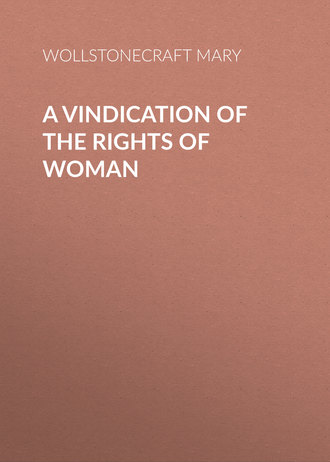 полная версия
полная версияA Vindication of the Rights of Woman
Besides, this would be a sure way to promote early marriages, and from early marriages the most salutary physical and moral effects naturally flow. What a different character does a married citizen assume from the selfish coxcomb, who lives but for himself, and who is often afraid to marry lest he should not be able to live in a certain style. Great emergencies excepted, which would rarely occur in a society of which equality was the basis, a man could only be prepared to discharge the duties of public life, by the habitual practice of those inferior ones which form the man.
In this plan of education, the constitution of boys would not be ruined by the early debaucheries, which now make men so selfish, nor girls rendered weak and vain, by indolence and frivolous pursuits. But, I presuppose, that such a degree of equality should be established between the sexes as would shut out gallantry and coquetry, yet allow friendship and love to temper the heart for the discharge of higher duties.
These would be schools of morality—and the happiness of man, allowed to flow from the pure springs of duty and affection, what advances might not the human mind make? Society can only be happy and free in proportion as it is virtuous; but the present distinctions, established in society, corrode all private, and blast all public virtue.
I have already inveighed against the custom of confining girls to their needle, and shutting them out from all political and civil employments; for by thus narrowing their minds they are rendered unfit to fulfil the peculiar duties which nature has assigned them.
Only employed about the little incidents of the day, they necessarily grow up cunning. My very soul has often sickened at observing the sly tricks practised by women to gain some foolish thing on which their silly hearts were set. Not allowed to dispose of money, or call any thing their own, they learn to turn the market penny; or, should a husband offend, by staying from home, or give rise to some emotions of jealousy—a new gown, or any pretty bauble, smooths Juno's angry brow.
But these LITTLENESSES would not degrade their character, if women were led to respect themselves, if political and moral subjects were opened to them; and I will venture to affirm, that this is the only way to make them properly attentive to their domestic duties. An active mind embraces the whole circle of its duties, and finds time enough for all. It is not, I assert, a bold attempt to emulate masculine virtues; it is not the enchantment of literary pursuits, or the steady investigation of scientific subjects, that lead women astray from duty. No, it is indolence and vanity —the love of pleasure and the love of sway, that will reign paramount in an empty mind. I say empty, emphatically, because the education which women now receive scarcely deserves the name. For the little knowledge they are led to acquire during the important years of youth, is merely relative to accomplishments; and accomplishments without a bottom, for unless the understanding be cultivated, superficial and monotonous is every grace. Like the charms of a made-up face, they only strike the senses in a crowd; but at home, wanting mind, they want variety. The consequence is obvious; in gay scenes of dissipation we meet the artificial mind and face, for those who fly from solitude dread next to solitude, the domestic circle; not having it in their power to amuse or interest, they feel their own insignificance, or find nothing to amuse or interest themselves.
Besides, what can be more indelicate than a girl's coming out in the fashionable world? Which, in other words, is to bring to market a marriageable miss, whose person is taken from one public place to another, richly caparisoned. Yet, mixing in the giddy circle under restraint, these butterflies long to flutter at large, for the first affection of their souls is their own persons, to which their attention has been called with the most sedulous care, whilst they were preparing for the period that decides their fate for life. Instead of pursuing this idle routine, sighing for tasteless show, and heartless state, with what dignity would the youths of both sexes form attachments in the schools that I have cursorily pointed out; in which, as life advanced, dancing, music, and drawing, might be admitted as relaxations, for at these schools young people of fortune ought to remain, more or less, till they were of age. Those, who were designed for particular professions, might attend, three or four mornings in the week, the schools appropriated for their immediate instruction.
I only drop these observations at present, as hints; rather, indeed as an outline of the plan I mean, than a digested one; but I must add, that I highly approve of one regulation mentioned in the pamphlet already alluded to (The Bishop of Autun), that of making the children and youths independent of the masters respecting punishments. They should be tried by their peers, which would be an admirable method of fixing sound principles of justice in the mind, and might have the happiest effect on the temper, which is very early soured or irritated by tyranny, till it becomes peevishly cunning, or ferociously overbearing.
My imagination darts forward with benevolent fervour to greet these amiable and respectable groups, in spite of the sneering of cold hearts, who are at liberty to utter, with frigid self-importance, the damning epithet— romantic; the force of which I shall endeavour to blunt by repeating the words of an eloquent moralist. "I know not whether the allusions of a truly humane heart, whose zeal renders every thing easy, is not preferable to that rough and repulsing reason, which always finds in indifference for the public good, the first obstacle to whatever would promote it."
I know that libertines will also exclaim, that woman would be unsexed by acquiring strength of body and mind, and that beauty, soft bewitching beauty! would no longer adorn the daughters of men. I am of a very different opinion, for I think, that, on the contrary, we should then see dignified beauty, and true grace; to produce which, many powerful physical and moral causes would concur. Not relaxed beauty, it is true, nor the graces of helplessness; but such as appears to make us respect the human body as a majestic pile, fit to receive a noble inhabitant, in the relics of antiquity.
I do not forget the popular opinion, that the Grecian statues were not modelled after nature. I mean, not according to the proportions of a particular man; but that beautiful limbs and features were selected from various bodies to form an harmonious whole. This might, in some degree, be true. The fine ideal picture of an exalted imagination might be superior to the materials which the painter found in nature, and thus it might with propriety be termed rather the model of mankind than of a man. It was not, however, the mechanical selection of limbs and features, but the ebullition of an heated fancy that burst forth; and the fine senses and enlarged understanding of the artist selected the solid matter, which he drew into this glowing focus.
I observed that it was not mechanical, because a whole was produced—a model of that grand simplicity, of those concurring energies, which arrest our attention and command our reverence. For only insipid lifeless beauty is produced by a servile copy of even beautiful nature. Yet, independent of these observations, I believe, that the human form must have been far more beautiful than it is at present, because extreme indolence, barbarous ligatures, and many causes, which forcibly act on it, in our luxurious state of society, did not retard its expansion, or render it deformed. Exercise and cleanliness appear to be not only the surest means of preserving health, but of promoting beauty, the physical causes only considered; yet, this is not sufficient, moral ones must concur, or beauty will be merely of that rustic kind which blooms on the innocent, wholesome countenances of some country people, whose minds have not been exercised. To render the person perfect, physical and moral beauty ought to be attained at the same time; each lending and receiving force by the combination. Judgment must reside on the brow, affection and fancy beam in the eye, and humanity curve the cheek, or vain is the sparkling of the finest eye or the elegantly turned finish of the fairest features; whilst in every motion that displays the active limbs and well-knit joints, grace and modesty should appear. But this fair assemblage is not to be brought together by chance; it is the reward of exertions met to support each other; for judgment can only be acquired by reflection, affection, by the discharge of duties, and humanity by the exercise of compassion to every living creature.
Humanity to animals should be particularly inculcated as a part of national education, for it is not at present one of our national virtues. Tenderness for their humble dumb domestics, amongst the lower class, is oftener to be found in a savage than a civilized state. For civilization prevents that intercourse which creates affection in the rude hut, or mud cabin, and leads uncultivated minds who are only depraved by the refinements which prevail in the society, where they are trodden under foot by the rich, to domineer over them to revenge the insults that they are obliged to bear from their superiours.
This habitual cruelty is first caught at school, where it is one of the rare sports of the boys to torment the miserable brutes that fall in their way. The transition, as they grow up, from barbarity to brutes to domestic tyranny over wives, children, and servants, is very easy. Justice, or even benevolence, will not be a powerful spring of action, unless it extend to the whole creation; nay, I believe that it may be delivered as an axiom, that those who can see pain, unmoved, will soon learn to inflict it.
The vulgar are swayed by present feelings, and the habits which they have accidentally acquired; but on partial feelings much dependence cannot be placed, though they be just; for, when they are not invigorated by reflection, custom weakens them, till they are scarcely felt. The sympathies of our nature are strengthened by pondering cogitations, and deadened by thoughtless use. Macbeth's heart smote him more for one murder, the first, than for a hundred subsequent ones, which were necessary to back it. But, when I used the epithet vulgar, I did not mean to confine my remark to the poor, for partial humanity, founded on present sensations or whim, is quite as conspicuous, if not more so, amongst the rich.
The lady who sheds tears for the bird starved in a snare, and execrates the devils in the shape of men, who goad to madness the poor ox, or whip the patient ass, tottering under a burden above its strength, will, nevertheless, keep her coachman and horses whole hours waiting for her, when the sharp frost bites, or the rain beats against the well-closed windows which do not admit a breath of air to tell her how roughly the wind blows without. And she who takes her dogs to bed, and nurses them with a parade of sensibility, when sick, will suffer her babes to grow up crooked in a nursery. This illustration of my argument is drawn from a matter of fact. The woman whom I allude to was handsome, reckoned very handsome, by those who do not miss the mind when the face is plump and fair; but her understanding had not been led from female duties by literature, nor her innocence debauched by knowledge. No, she was quite feminine, according to the masculine acceptation of the word; and, so far from loving these spoiled brutes that filled the place which her children ought to have occupied, she only lisped out a pretty mixture of French and English nonsense, to please the men who flocked round her. The wife, mother, and human creature, were all swallowed up by the factitious character, which an improper education, and the selfish vanity of beauty, had produced.
I do not like to make a distinction without a difference, and I own that I have been as much disgusted by the fine lady who took her lap-dog to her bosom, instead of her child; as by the ferocity of a man, who, beating his horse, declared, that he knew as well when he did wrong as a Christian.
This brood of folly shows how mistaken they are who, if they allow women to leave their harams, do not cultivate their understanding, in order to plant virtues in their hearts. For had they sense, they might acquire that domestic taste which would lead them to love with reasonable subordination their whole family, from the husband to the house-dog; nor would they ever insult humanity in the person of the most menial servant, by paying more attention to the comfort of a brute, than to that of a fellow-creature.
My observations on national education are obviously hints; but I principally wish to enforce the necessity of educating the sexes together to perfect both, and of making children sleep at home, that they may learn to love home; yet to make private support instead of smothering public affections, they should be sent to school to mix with a number of equals, for only by the jostlings of equality can we form a just opinion of ourselves.
To render mankind more virtuous, and happier of course, both sexes must act from the same principle; but how can that be expected when only one is allowed to see the reasonableness of it? To render also the social compact truly equitable, and in order to spread those enlightening principles, which alone can meliorate the fate of man, women must be allowed to found their virtue on knowledge, which is scarcely possible unless they be educated by the same pursuits as men. For they are now made so inferiour by ignorance and low desires, as not to deserve to be ranked with them; or, by the serpentine wrigglings of cunning they mount the tree of knowledge and only acquire sufficient to lead men astray.
It is plain from the history of all nations, that women cannot be confined to merely domestic pursuits, for they will not fulfil family duties, unless their minds take a wider range, and whilst they are kept in ignorance, they become in the same proportion, the slaves of pleasure as they are the slaves of man. Nor can they be shut out of great enterprises, though the narrowness of their minds often make them mar what they are unable to comprehend.
The libertinism, and even the virtues of superior men, will always give women, of some description, great power over them; and these weak women, under the influence of childish passions and selfish vanity, will throw a false light over the objects which the very men view with their eyes, who ought to enlighten their judgment. Men of fancy, and those sanguine characters who mostly hold the helm of human affairs, in general, relax in the society of women; and surely I need not cite to the most superficial reader of history, the numerous examples of vice and oppression which the private intrigues of female favourites have produced; not to dwell on the mischief that naturally arises from the blundering interposition of well-meaning folly. For in the transactions of business it is much better to have to deal with a knave than a fool, because a knave adheres to some plan; and any plan of reason may be seen through much sooner than a sudden flight of folly. The power which vile and foolish women have had over wise men, who possessed sensibility, is notorious; I shall only mention one instance.
Whoever drew a more exalted female character than Rousseau? though in the lump he constantly endeavoured to degrade the sex. And why was he thus anxious? Truly to justify to himself the affection which weakness and virtue had made him cherish for that fool Theresa. He could not raise her to the common level of her sex; and therefore he laboured to bring woman down to her's. He found her a convenient humble companion, and pride made him determine to find some superior virtues in the being whom he chose to live with; but did not her conduct during his life, and after his death, clearly show how grossly he was mistaken who called her a celestial innocent. Nay, in the bitterness of his heart, he himself laments, that when his bodily infirmities made him no longer treat her like a woman, she ceased to have an affection for him. And it was very natural that she should, for having so few sentiments in common, when the sexual tie was broken, what was to hold her? To hold her affection whose sensibility was confined to one sex, nay, to one man, it requires sense to turn sensibility into the broad channel of humanity: many women have not mind enough to have an affection for a woman, or a friendship for a man. But the sexual weakness that makes woman depend on man for a subsistence, produces a kind of cattish affection, which leads a wife to purr about her husband, as she would about any man who fed and caressed her.
Men, are however, often gratified by this kind of fondness which is confined in a beastly manner to themselves, but should they ever become more virtuous, they will wish to converse at their fire-side with a friend, after they cease to play with a mistress. Besides, understanding is necessary to give variety and interest to sensual enjoyments, for low, indeed, in the intellectual scale, is the mind that can continue to love when neither virtue nor sense give a human appearance to an animal appetite. But sense will always preponderate; and if women are not, in general, brought more on a level with men, some superior women, like the Greek courtezans will assemble the men of abilities around them, and draw from their families many citizens, who would have stayed at home, had their wives had more sense, or the graces which result from the exercise of the understanding and fancy, the legitimate parents of taste. A woman of talents, if she be not absolutely ugly, will always obtain great power, raised by the weakness of her sex; and in proportion as men acquire virtue and delicacy: by the exertion of reason, they will look for both in women, but they can only acquire them in the same way that men do.
In France or Italy have the women confined themselves to domestic life? though they have not hitherto had a political existence, yet, have they not illicitly had great sway? corrupting themselves and the men with whose passions they played? In short, in whatever light I view the subject, reason and experience convince me, that the only method of leading women to fulfil their peculiar duties, is to free them from all restraint by allowing them to participate the inherent rights of mankind.
Make them free, and they will quickly become wise and virtuous, as men become more so; for the improvement must be mutual, or the justice which one half of the human race are obliged to submit to, retorting on their oppressors, the virtue of man will be worm-eaten by the insect whom he keeps under his feet.
Let men take their choice, man and woman were made for each other, though not to become one being; and if they will not improve women, they will deprave them!
I speak of the improvement and emancipation of the whole sex, for I know that the behaviour of a few women, who by accident, or following a strong bent of nature, have acquired a portion of knowledge superior to that of the rest of their sex, has often been over-bearing; but there have been instances of women who, attaining knowledge, have not discarded modesty, nor have they always pedantically appeared to despise the ignorance which they laboured to disperse in their own minds. The exclamations then which any advice respecting female learning, commonly produces, especially from pretty women, often arise from envy. When they chance to see that even the lustre of their eyes, and the flippant sportiveness of refined coquetry will not always secure them attention, during a whole evening, should a woman of a more cultivated understanding endeavour to give a rational turn to the conversation, the common source of consolation is, that such women seldom get husbands. What arts have I not seen silly women use to interrupt by FLIRTATION, (a very significant word to describe such a manoeuvre) a rational conversation, which made the men forget that they were pretty women.
But, allowing what is very natural to man—that the possession of rare abilities is really calculated to excite over-weening pride, disgusting in both men and women—in what a state of inferiority must the female faculties have rusted when such a small portion of knowledge as those women attained, who have sneeringly been termed learned women, could be singular? Sufficiently so to puff up the possessor, and excite envy in her contemporaries, and some of the other sex. Nay, has not a little rationality exposed many women to the severest censure? I advert to well known-facts, for I have frequently heard women ridiculed, and every little weakness exposed, only because they adopted the advice of some medical men, and deviated from the beaten track in their mode of treating their infants. I have actually heard this barbarous aversion to innovation carried still further, and a sensible woman stigmatized as an unnatural mother, who has thus been wisely solicitous to preserve the health of her children, when in the midst of her care she has lost one by some of the casualties of infancy which no prudence can ward off. Her acquaintance have observed, that this was the consequence of new-fangled notions—the new-fangled notions of ease and cleanliness. And those who, pretending to experience, though they have long adhered to prejudices that have, according to the opinion of the most sagacious physicians, thinned the human race, almost rejoiced at the disaster that gave a kind of sanction to prescription.
Indeed, if it were only on this account, the national education of women is of the utmost consequence; for what a number of human sacrifices are made to that moloch, prejudice! And in how many ways are children destroyed by the lasciviousness of man? The want of natural affection in many women, who are drawn from their duty by the admiration of men, and the ignorance of others, render the infancy of man a much more perilous state than that of brutes; yet men are unwilling to place women in situations proper to enable them to acquire sufficient understanding to know how even to nurse their babes.
So forcibly does this truth strike me, that I would rest the whole tendency of my reasoning upon it; for whatever tends to incapacitate the maternal character, takes woman out of her sphere.
But it is vain to expect the present race of weak mothers either to take that reasonable care of a child's body, which is necessary to lay the foundation of a good constitution, supposing that it do not suffer for the sins of its fathers; or to manage its temper so judiciously that the child will not have, as it grows up, to throw off all that its mother, its first instructor, directly or indirectly taught, and unless the mind have uncommon vigour, womanish follies will stick to the character throughout life. The weakness of the mother will be visited on the children! And whilst women are educated to rely on their husbands for judgment, this must ever be the consequence, for there is no improving an understanding by halves, nor can any being act wisely from imitation, because in every circumstance of life there is a kind of individuality, which requires an exertion of judgment to modify general rules. The being who can think justly in one track, will soon extend its intellectual empire; and she who has sufficient judgment to manage her children, will not submit right or wrong, to her husband, or patiently to the social laws which makes a nonentity of a wife.
In public schools women, to guard against the errors of ignorance, should be taught the elements of anatomy and medicine, not only to enable them to take proper care of their own health, but to make them rational nurses of their infants, parents, and husbands; for the bills of mortality are swelled by the blunders of self-willed old women, who give nostrums of their own, without knowing any thing of the human frame. It is likewise proper, only in a domestic view, to make women, acquainted with the anatomy of the mind, by allowing the sexes to associate together in every pursuit; and by leading them to observe the progress of the human understanding in the improvement of the sciences and arts; never forgetting the science of morality, nor the study of the political history of mankind.
A man has been termed a microcosm; and every family might also be called a state. States, it is true, have mostly been governed by arts that disgrace the character of man; and the want of a just constitution, and equal laws, have so perplexed the notions of the worldly wise, that they more than question the reasonableness of contending for the rights of humanity. Thus morality, polluted in the national reservoir, sends off streams of vice to corrupt the constituent parts of the body politic; but should more noble, or rather more just principles regulate the laws, which ought to be the government of society, and not those who execute them, duty might become the rule of private conduct.






